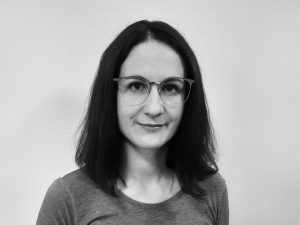Our non-profit organization BUDÚCNOSŤ, n.o. operating in Nitra and the wider area is currently implementing a project called “FUTURE WITHOUT VIOLENCE”. Improvement and innovation of services provided for persons at risk of violence in the context of addiction, which is implemented from October 2022 to March 2024. The goal of the project is to offer specialized services for persons experiencing violence in connection with addiction, while it is directly addressed to clients experiencing violence in the context of addiction, children of clients at risk of violence in the context of addiction, teaching staff of primary schools and also the general public by bringing the topic closer and, in particular, providing the possibilities of solving the mentioned problems. We present a series of mini-interviews with female employees of our organization, who at the same time represent various types of so-called helping professions.
Interview with social worker Mgr. Silvia Morávková, PhD.

1/ In what position do you work in the organization BUDÚCNOSŤ, n.o. and what is your main job in relation to the Norwegian project?
In the non-profit organization BUDÚCNOSŤ I work as a social worker within the Center for Children of the Family. I participate in the outpatient performance of socio-legal protection of children and social guardianship measures for children and their families. Our target clientele are: children and youth threatened by risky behavior and abuse of addictive substances (including alcohol) or harmful addictive activities, also children endangered by the behavior of a parent or person who takes care of them, abusing addictive substances, or addicted to addictive substances or harmful addictive activities. These are families that present a risky environment for their members mainly due to the abuse of addictive substances (including alcohol), harmful addictive activities, or the addiction of individual family members and the consequences of such behavior.
In relation to the Norwegian project, I work as a special pedagogue. My main job is: providing special-pedagogical counseling as part of complex counseling services to children at risk of violence in the context of addiction, and providing crisis intervention and special-pedagogical diagnostics. In my opinion, a very important, essential activity is joint team planning of further work procedures with the child, taking into account his/her individuality, using specialized professional methods and procedures at work. I primarily focus on working with the child, but an equally important part is communication and intervention with the child’s parent.
2/ What professional background does your position require, or what competences and skills you need to have and why?
My job position requires an education in the field of special education. I see it as a big plus that I have both education and experience in the field of social work. This allows me to look at the specific case of a child – family comprehensively, to bring a multidisciplinary approach to the intervention. I consider continuous education and expanding one’s horizons, professional knowledge and skills to be necessary and very helpful. I am helped by the study of professional literature, or various seminars, workshops and short-term courses focusing on the issues of trauma, crisis intervention, communication, relational bonds, projective diagnostic tools, or special therapies.
3/ What do you think about the mutual link between the two great themes, addictions and violence?
From my point of view, these are very serious and related topics. If we talk about addiction in the family as such, its effects on children in the form of violence are obvious. Children show signs of neglect, lack of relationship with a parent, psychological violence and also in some cases physical or other forms of violence. It is therefore necessary to combine and solve these two topics at the same time within the framework of multidisciplinary approach.
4/ What is your preferable approach to clients and why?
First of all, from my position, I try to create an atmosphere of safety and unconditional acceptance. I see the creation of a relationship with the client and its gradual building as key. I know from experience that it is important not to pressure the client and let some things flow naturally. The basis is to perceive everyone as an individual with different needs, givens, readiness to change something in life. I mainly reflect on what the client brings to the meeting, what he/she enter my office with, what kind of day he/she has had. I can also have different techniques and activities ready, but ultimately the meeting can develop in a completely different direction and it is important not to push what I have and want, but what the other person needs and wants at the given moment. My experience is that when the client feels sufficiently safe and accepted with what he/she has and brings and the right time comes, the situation can gradually move towards healing towards himself/herself and the environment.
5/ Which themes are the most visible ones in the sphere of violence in the context of addictions in your opinion? Which ones require the most thorough solutions?
Within the topic of violence in the context of addictions, the most serious, in my opinion, are those issues that directly affect children. That is, if it all takes place in the family. The impacts and consequences of violence and addiction on children are often unimaginable and affect the child in a negative way for his/her current functioning and future. Therefore, it is important to grasp this issue in time and it is desirable to work with the whole family. It is also necessary to treat the situation especially in the direction of the child’s safety and to create the most acceptable conditions for his/her functioning.